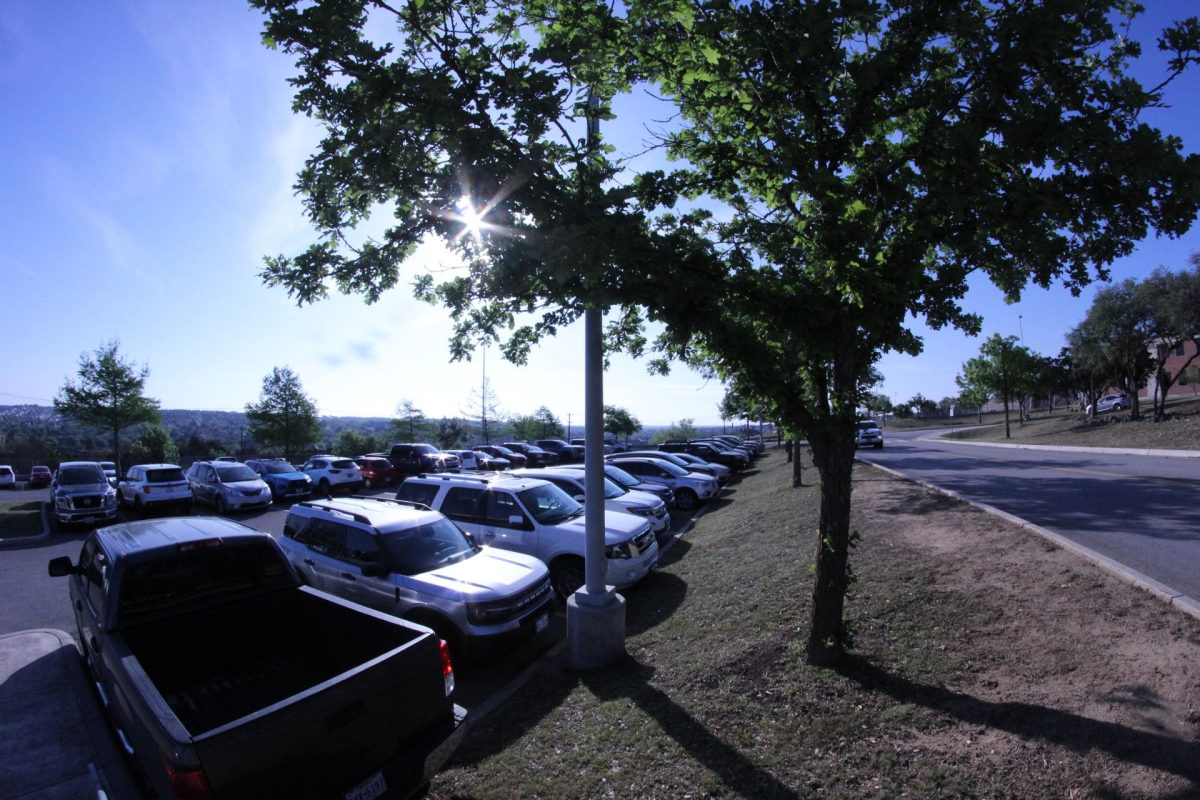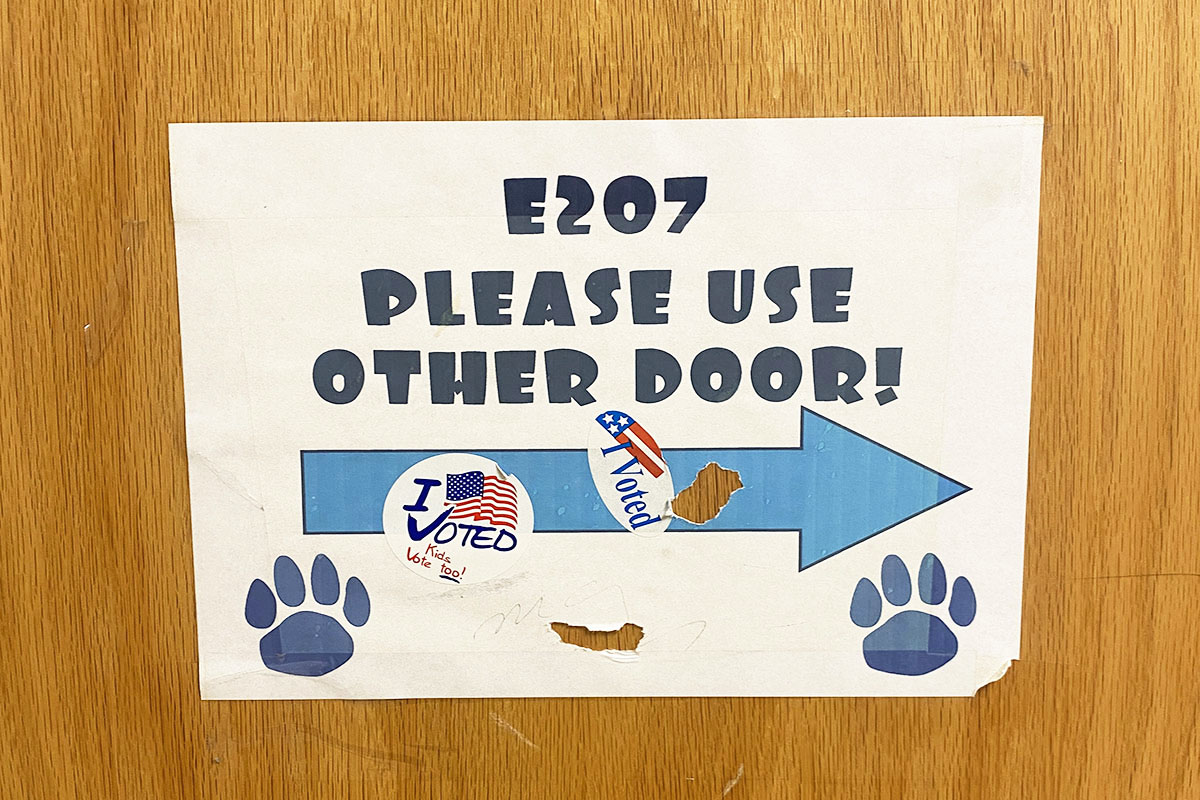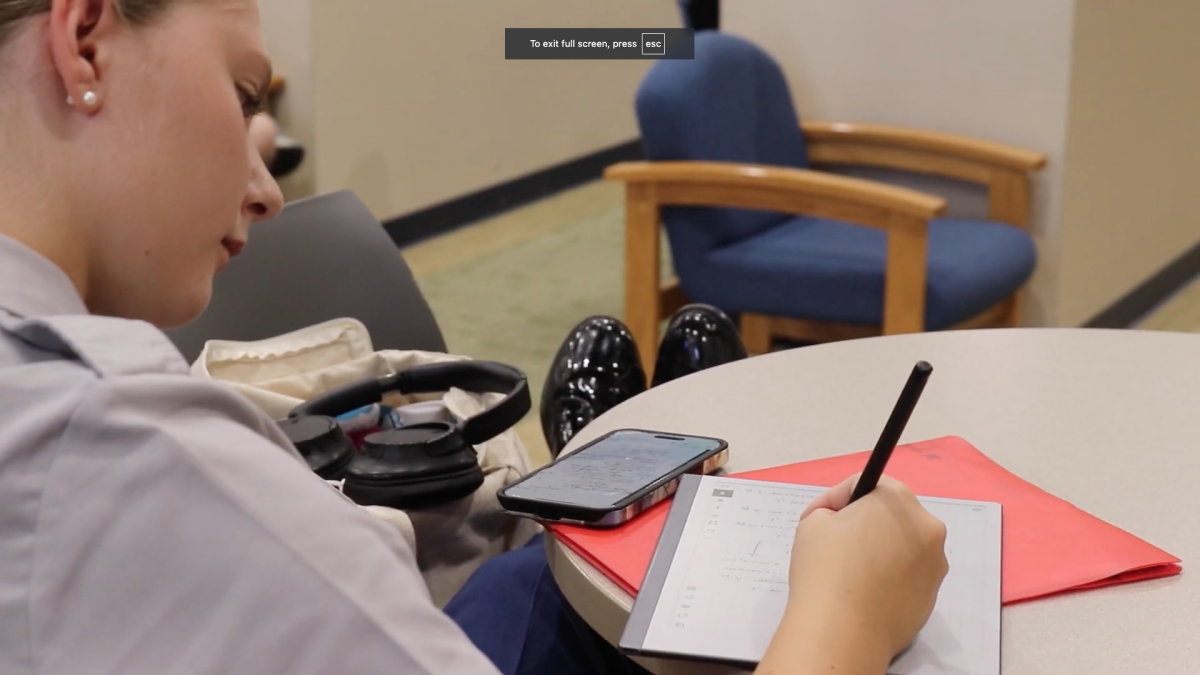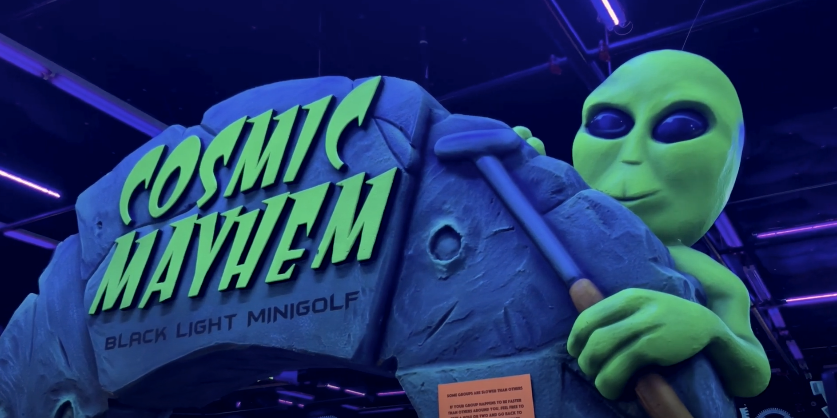by Audrey Payne | copy editor
An actor has been hiding in our midst. Working as a substitute teacher and calling students “little brother” or “little sister,” David Mooney doesn’t speak much about his acting career, but he has many stories to tell.
“My mother had been a singer and all that so she encouraged me. I was always I guess a drama king or something, you know. I guess my mother thought I was a little over the top, so she encouraged me to be interested in the art,” Mooney said. “And she had a lovely voice, but she never pursued it so she kind of encouraged me to pursue it.”
Mooney has acted in 15 film credits (movies or TV shows), produced two film credits, and acted in numerous commercials.
“My favorite part of being an actor is the creative process. The business part, it’s a business, acting, and filming, and theatre. My favorite part was the creative process, actually when you’re on the set, doing it, when you’re telling the story. And when you’re putting all of the little scenes together that will ultimately will be edited into the finished film, that’s my favorite process. It’s a great sense of community,” Mooney said.
Though he was not a star actor in most of his roles, there is one film where Mooney was a lead role. “The Baby” is a horror film made in 1973, and Mooney played “Baby.”
“One of my most challenging experiences was playing [an impaired] boy… in a movie called “The Baby.” And that’s now become a cult film. The acting part of that was so difficult because I had to totally de-man-ize myself and become a baby, act like a baby….,” Mooney said. “And I just, I’d always loved babies, so I was around baby cousins and all this, and had held babies and babies sat on my lap and all that, so I was aware of how babies, the innocence they had and the dependability they have on you and how they’re so real because they react to the stimulus that’s given them at the time. So I had to learn all those things and make sure to incorporate that into that role.”
The film gave him new opportunities to spend time acting and interacting with older film stars.
“I got to work with some wonderful, older stars. Ruth Roman, who was a film star from the 40’s and 50’s, she was never a big star like Elizabeth Taylor, but she was a major star. She was probably in her middle to late fifties when she did this movie. And she’s a wonderful actress. She walks on, and there’s a presence, and you know it. It was neat to get to work with people like that who had worked in the old system of Hollywood, and they brought all that they learned to the table there,” Mooney said. “I learned a lot from her.”
Ruth Roman used some interesting acting techniques while filming The Baby, according to Mooney.
“If you’re her enemy as a character, in the film, if your character is her enemy, she becomes your enemy all during the shooting of the film. I guess that’s something she learned in the old days. But she keeps that tension going so that she and the other major actress, Anjanette Comer, that were in the movie, they had this tension because they were enemies. They had this tension going on and they played it off-camera as well as on-camera. It made the film have more life to it and everything. But it was really interesting what I learned there,” Mooney said.

Mooney has also acted with some more modern movie stars, including Robert Downey Jr. (known for “Iron Man”, “The Avengers” and “Sherlock Holmes”), Dan Aykroyd (known for “Ghostbusters”), David Duchovny (“X-Files”) and more.
“I got to do “Chaplin” with Robert Downey Jr. back in 1992, and the reason I got cast is because I could do a pratfall. A pratfall is where you can fall on your face, you know, just go *thump* like that. And so, they were looking for somebody that could do that, and so I went on the interview, and I met Mr. Attenborough,” Mooney said.
“Chaplin” was a major movie production, not something that Mooney got to participate in often, and it was an entirely different experience, according to Mooney.
“That was wonderful because it went back into time, into the silent screen, silent film part of the industry, back when Charlie Chaplin and all these famous silent film stars were very popular, and they totally out in the one part of the San Fernando Valley in California, they reproduced the entire set that they used to be on,” Mooney said. “You walked on and you felt like you were walking back 100 years, 80 years, or 70 years back. That was so exciting. It was just the whole feeling. And it was a major movie, you know, it was a big budget movie and golly, it was a wonderful experience.”
His most recent project is in “My All American”, a movie about Freddie Steinmark, a football player at UT during the late 1960s. He plays a football fan as an extra.
“The casting director from Austin sent me an email and asked me if I would be willing to do it. And I thought, ‘Well, I’m not doing anything. It’s the summer,’ and then I found out what it’s about and I thought, ‘Yes!’ because I got to dress like, well, I’m older now, so I got to dress like like an older guy would have dressed back then. But, it was a lot of fun. It was very hard work. I worked like 14 hours a day. I worked till 1 o’clock and 1:30 in the morning. And then I would go home and in eight hours I would have to come back. But thank goodness it was only for three weeks, because I think it was like 12 days or something like that all together, 13 days, something like that,” Mooney said. “It was fun because I had never been an extra before. I had never done that before because I don’t like to do it, so. But I wanted to do it because I wanted to be in something about UT in the 60s. So that would be a memory I would have. I don’t want to work as an extra because you don’t really get to tell part of the story, you’re just atmosphere. You’re not really part of telling the story. And that’s the great part of it.”
Mooney began his acting career by participating in high school theatre and competing in high school drama competitions.
“When I got into high school, I really got interested in drama, so I would get in the school plays and I started doing contests and I won state in dramatic interpretation and state in humorous interpretation. At that time, the Waco speech tournament was the largest speech tournament and I won first place at that tournament. So I kind of thought, ‘Mmm, this is encouraging,’ Mooney said. “And then, back then, there was an actor named James Dean, he was a wonderfully, very sensitive actor, so, when I went to see his movies, I was very touched that, ‘Wow. How you can tell a story, how you can interpret a story and tell a story as an actor!’ And so, I got very interested in that.”
As soon as he got into college, Mooney became increasingly involved in theatre, commercials and other productions.
“I was at college, I transferred to the University of Texas and went there and did all their major stage productions. I played different kinds of roles. And, primarily, I did some commercials in Dallas as a teenager, so I did the Teenage Miss America pageant commercials and all that back then, and advertised Fritos. But, when I graduated from the University of Texas in 1966, I traveled out to California. I got a job so that I could support myself, so I was out there for about six months. I started started doing theatre. I got into a group called the Los Angeles Repertory Theatre, which had a lot of professionals in it. So I got in there and got to doing stuff and playing the juvenile roles, because I looked ten years younger than I was,” Mooney said. “A lovely lady called Dodo Denney, she is now passed away but she was a character actress and if you saw her, well, maybe not now your generation but, maybe about ten years ago, before that you would recognize her face. Anyway, she took a liking to me and she recommended me to her agent. Her agent signed me, and I started doing commercials, a lot of commercials. And then, slowly, that segwayed into doing a Disney film. My first movie job was doing a Disney film. The commercials allowed me to become a member of the Screen Actors Guild because after the second job you get, professional job you get, you have to join Screen Actors Guild. And so, I joined Screen Actors Guild in 1968, and then started doing films and television.”
Mooney described the experience of being a working actor at a young age as nerve-wracking.
““When you’re young, and when you’re trying to get in, it can be, you know, you do the scene and you go, ‘Did I do that right?’ You come off and you think ‘Oh, I’ll never work again. Will I ever get a job again, or?” Or you do a job, you get a job and you do it and after that, you don’t get another interview for three or four or five weeks, and you think, ‘Am I ever going to work again? Was that the last time?’ Those are anxieties you have as a young actor,” Mooney said.
Though Mooney was not in many leading roles, he acted in lots of roles and productions over the years.
“I was never a star actor; I was just a working actor. I did lots of print work; my picture was on billboards all over the country. I’d go outside and and drive down the road and I’d be up, ‘Woah, what’s that!’ I did that for a long time, and as I started getting older, things started changing. Hollywood started changing, and it wasn’t as easy to access casting things and all that. I had a certification to teach, so I started teaching and going on interviews at the same time so I would make a living. So I did some some Toyota commercials and things like that over a period of time. And I did some theater productions. I tried to stay active in theater. And the casting director from Universal Studios saw me in a play and liked me and started casting me, and so I got cast in “Six Million Dollar Man” and “Emergency!” and “World’s Greatest Athlete.” Those were all regular job roles, you know what I mean? You do those roles and that pays your rent, just like if you were a teacher, you know, you do that. But I didn’t get a part in a pilot or anything.”
Mooney moved back to Texas from California in 1993, the year after the Rodney King riots in Los Angeles.
“I decided to come back here in 1993. I was in the LA riots, and it got pretty hairy there. It got pretty scary. And I decided, ‘I don’t want to grow old here. I don’t want to stay in California.’ So, I came back here in 1993. And now I’m doing commercials and stuff here. Reading for movies, and reading for TV. Mainly commercials, you do here, cause there’s not a big market for movies and all that. But, a movie comes through every now and then and I audition for it.”
Mooney described Hollywood and the acting business today compared to the business when he was entered in the late 60s, saying that it has become more focused on business than the art form. (adjust???)
“Today, it’s not an easy business. I came in at the very end of the 60’s, I came in on the very end of the Hollywood era of picture-making. It was still an artistic thing. And then it started just getting dead-level business. So all that kind of fun part of it was beginning to go out of it. Because when I first went out there, I would write producers because I would hear they were doing movies, so I would just write them and send it to the studio. And I got in to see George Lucas, and another, Otto Preminger, another big film maker at the time. And so, I wrote him a letter, and he had me in and saw me and interviewed me. You couldn’t do that ten years after that because the big agencies had taken over, so everything was packaged,” Mooney said. “In other words, if you were with that agency, they would get this movie to use all of their people. And so anybody outside that agency had a hard time getting in to get anything else. So it became very in-house. It’s now a business that’s not any fun anymore. It’s a very hard business to get into into now, unless you have a plugin somewhere, that you know someone, or that you’re related to someone. The way you do that is you do some of these independent films, or the films that are done through independent producers and directors who will use new people, or they will at least see you. That’s the way you get in and if you’re in a successful independent film, the larger filmmakers or the larger production companies will look at you. You’re a commodity, you’re a piece of merchandise.”
Mooney now does commercials, and auditions for smaller parts in independent films or TV shows when they come through Texas. Mooney says that his experiences are wonderful because he can share them with others.
“Now I do commercials here. I go read from independent movies and some major film that’s coming here into town and they’re going to use local people for the small roles. I go on all of those and everything, so I still do that. And I substitute teach, and I’m retired. And I garden. But I always feel like all those wonderful experiences that I’ve had, I can share with you. I can share if I get an interview or if I get an audition and it’s supposed to be on tape that I can get someone from here to do it with me and it gives you experience to do it. And that, those are the things that I like, that it gives something to somebody else’s life. Because it’s all just work, it’s not just like Hollywood. Those people work very hard, you know, and very grueling. If you’re on a television series, it’s grueling. You shoot 13 pages a day, 12-13 pages of dialogue a day. And when you’re making a movie you shoot 3. So that’s why a movie’s production value is so much bigger and better than what you see on television because they have to do it very fast. It’s a hard business today,” Mooney said. “As a young person, I probably wouldn’t go into it. If I were going into it today and I could see the business, if the stars were out of my eyes, you know. But, just to look at it as a business for what it is, you know, I’d probably try another business to use my creativity. I try to be creative in the classroom, be creative with the kids. And creative in my life, at home in gardening or whatever. I think God gives you those gifts and a gift is a gift that you give someone else.”
If you want to learn more about Mooney’s acting career, click here to go to his IMDb page.







